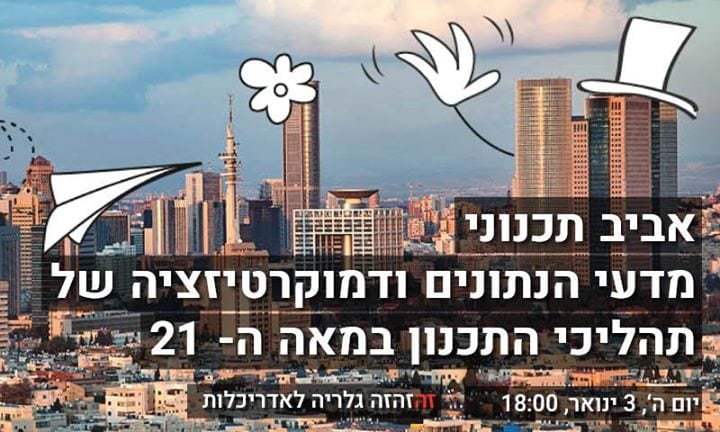Thu 3 January 2019 | 6:00 pm - 9:00 pm
Hangar 21 - Namal Tel Aviv, Tel Aviv, 40 NIS

** PLEASE NOTE THE EVENT WILL BE IN HEBREW **
Urban planning is one of the most influential areas in the daily lives of every individual and citizen. However, despite the considerable progress in awareness and exposure to issues dealing with planning issues, which has focused itself on its professional and bureaucratic processes, its principles and considerations remain largely archaic, complex and inaccessible, relative to external involvement and openness, the knowledge of the system’s crooked ways , Regulations and regulations, and direct the planning processes.
The field of data science, which has been developing rapidly in recent years, combined with advanced technologies and renewable capabilities to collect and store huge amounts of information, as well as innovative methods for analysis and presentation of infinite data, may change this situation. It expands the circle of people who can generate information, analyze it and propose new alternatives to physical reality. By means of relatively easy and accessible means, it enables a wider range of stakeholders to reach deeper insights and understandings independently, and to develop parallel paths to diverse aspects of planning processes.
On the other hand, often the forces driving the technology and the tools used are motivated by business and selfish motives of the technology giants and various companies. These tools influence the design of human space in order to exploit it for economic gain, and not necessarily to improve it for the benefit of the citizen.
This evening, we will discuss the potential of expanding the planning toolbox as well as expanding its users, and making planning processes more open and diverse in the 21st century. What will these processes look like, who will shape them and who will benefit from them, and what their advantages and dangers are.
On the participants
Dana Hermesh, Architect (Tel Aviv University, 2013), worked at Bar-Orian Architects (2011-2017), graduate of Applied Urban Science and Informatics (NYU, 2018) and Head of Urban Data and Innovation At DRAW Brooklyn, New York.
In her master’s degree she specialized in the Town Planning Department of the New York City Department of Metropolitan Planning, where she worked on data-based urban research and code. Is engaged in the development of methods for the use of data and technology in favor of better and more correct planning and management of cities.
Her research on the economic feasibility of the Tel Aviv Quarter 3 program was published in The Marker in July 2018.
It is not enough to say Smart City: how the information revolution can make the planning profession (and cities in general) more efficient, more just, and truly wise: Big Data and innovative technologies are opening the planning and design of space to many more participants. , Small and large, analyze, shape and change space. On the other hand, the planning profession itself – the main designer of the urban environment, as well as its tools and bureaucracy – has not changed much since people began planning cities only a few hundred years ago.
Using an example of a spatial data-based study from the Tel Aviv municipality gis to assess the economic feasibility of the Quarter 3 program, I will try to base the discussion on what makes a city really smart, why we should expand the planning toolbox, what responsibility we have for our cities Who are smart enough to forget who they are for, and why architects and planners will dictate the answer to how technology can serve cities and the public, and not vice versa.
Nir Yariv is a developer of software that deals with code and open information. Together with Yair Assaf-Shapira, he initiated and leads an open TPS project from the Public Knowledge Workshop.
The Public Information Workshop is a body established by software and design professionals to promote the opening of public information in Israel. Alongside projects at the national level, such as the budget developer and an open conference, projects such as the Open Town Planning Scheme deal with the municipal level and try to bring residents and local activists information relevant to their area of residence.
During the establishment and development of the project, we encountered various roadblocks set up by state bodies to access information, intentionally and unintentionally, and we developed various methods to deal with them, from technological solutions to legal means. Today, we access the planning information of dozens of local authorities through an open TPS site, Facebook and Twitter pages and email alerts, and to our delight there is a significant improvement in the state’s willingness to release information to the public.
Public Information Workshop // Open Town Planning Scheme
Noga Myers, a graduate of the Urban and Regional Planning Program at the Technion, has been involved in strategic planning for decades in Israel. Since 2000 she has been involved in the promotion of smart cities and data-based planning and information systems.
Since 2017 she has been working at the Tel Aviv Municipality in the Municipal Knowledge Administration. She manages a team responsible for three main areas: knowledge management, the Internet, and digital projects, headed by the Digital project.
Believes in urban planning based on real data and current measurement and therefore integrated into the world of planning through the management and integration of information and municipal knowledge.
In my lecture, I will present the Digital project, the flagship project of the Tel Aviv-Jaffa Municipality, with an emphasis on data collection, integration of information and ongoing measurement, with the result being customer-oriented personal information.
Amitai Har Lev is a city planner, and is a graduate of the Technion. Planning expert in partnership with the public, strategy and consensus building. Serves as CEO of MODUS – Planners with People, a planning and consulting firm that specializes in designing and implementing planning strategies in partnership with the public through dialogue between stakeholders.
Check Out The Event Page On Facebook
